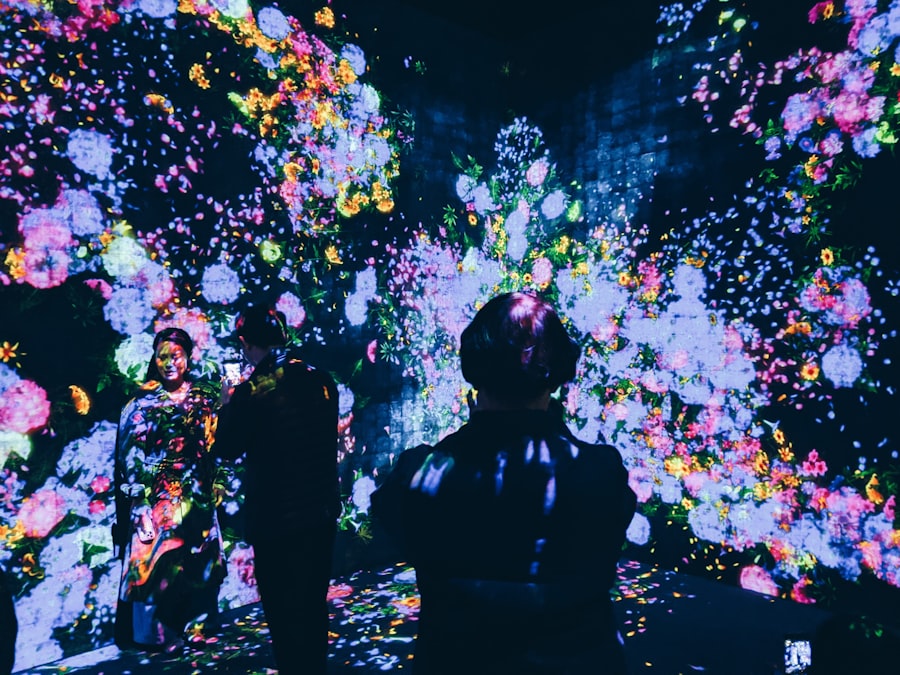Non-fungible tokens, commonly known as NFTs, have emerged as a revolutionary force in the digital landscape, transforming how we perceive ownership and authenticity in the virtual realm. Unlike cryptocurrencies such as Bitcoin or Ethereum, which are fungible and can be exchanged on a one-to-one basis, NFTs are unique digital assets that represent ownership of a specific item or piece of content. This uniqueness is encoded on a blockchain, typically Ethereum, which serves as a decentralized ledger that verifies and records transactions.
The rise of NFTs has been fueled by a growing interest in digital art, collectibles, and virtual goods, leading to a surge in their popularity among artists, collectors, and investors alike. The concept of NFTs has its roots in the broader blockchain technology movement, which aims to create secure and transparent systems for various applications. The introduction of NFTs has opened up new avenues for creators to monetize their work while providing buyers with verifiable proof of ownership.
This has led to a paradigm shift in how digital assets are valued and traded, with some NFTs fetching millions of dollars at auction. As the market continues to evolve, the implications of NFTs extend beyond art and collectibles, touching on industries such as gaming, music, and even real estate. The potential for NFTs to authenticate and verify ownership is particularly significant in the context of luxury goods and digital collectibles.
Key Takeaways
- NFTs are unique digital tokens that represent ownership of a specific item or piece of content on the blockchain.
- NFTs provide a secure and transparent way to authenticate digital collectibles, ensuring their provenance and scarcity.
- Luxury brands are increasingly using NFTs to authenticate their high-value goods, providing a new level of trust and exclusivity for customers.
- Using NFTs for authentication offers benefits such as provenance tracking, ownership verification, and potential for increased resale value.
- Challenges with NFT authentication include concerns about copyright infringement, environmental impact, and the need for widespread adoption and understanding.
Authenticating Digital Collectibles with NFTs
The authentication of digital collectibles is one of the most compelling applications of NFTs. In a world where digital content can be easily copied and shared, establishing provenance and ownership is crucial for both creators and collectors. NFTs provide a solution by embedding unique identifiers within the token that link it to the original creator or source.
This not only ensures that the digital collectible is genuine but also allows for the tracking of its ownership history. For instance, when an artist mints an NFT for their artwork, they create a digital certificate that proves they are the original creator. This certificate is stored on the blockchain, making it immutable and accessible to anyone who wishes to verify its authenticity.
Moreover, the use of NFTs in digital collectibles has given rise to new forms of engagement between creators and their audiences. Artists can now sell limited editions of their work as NFTs, creating scarcity in a digital environment that often lacks it. This scarcity can drive up demand and value, as collectors seek to own a piece of unique digital art.
Additionally, NFTs can include smart contracts that allow creators to earn royalties on future sales, ensuring they benefit from their work long after the initial sale. This innovative approach not only empowers artists but also enhances the overall experience for collectors who can take pride in owning verified pieces of digital history.
The Role of NFTs in Authenticating Luxury Goods

In the luxury goods sector, authenticity is paramount.
NFTs offer a robust solution by providing a secure method for verifying the authenticity of luxury items.
By associating an NFT with a physical product, brands can create a digital twin that serves as proof of authenticity. This digital twin can include detailed information about the product’s origin, materials used, and even its journey through the supply chain. For example, luxury fashion brands like Gucci and Prada are exploring ways to integrate NFTs into their products to combat counterfeiting and enhance customer trust.
The integration of NFTs into luxury goods also allows for enhanced customer experiences. When a consumer purchases a luxury item with an associated NFT, they gain access to exclusive content or experiences tied to that product. This could include virtual fashion shows, behind-the-scenes content from designers, or even invitations to exclusive events.
Such added value not only reinforces the authenticity of the product but also fosters a deeper connection between consumers and brands. As luxury brands continue to embrace this technology, the potential for NFTs to redefine customer engagement and loyalty becomes increasingly apparent.
Benefits of Using NFTs for Authentication
The benefits of using NFTs for authentication extend beyond mere verification; they encompass a range of advantages that can transform industries. One significant benefit is the transparency that blockchain technology provides. Every transaction involving an NFT is recorded on a public ledger, allowing anyone to trace its history from creation to current ownership.
This level of transparency helps build trust among consumers who may be wary of counterfeit products or fraudulent claims about authenticity. Additionally, NFTs facilitate easier resale and transferability of assets. Traditional methods of authentication often involve cumbersome processes that can deter potential buyers from purchasing high-value items.
With NFTs, transferring ownership is as simple as transferring the token itself on the blockchain. This streamlined process not only enhances liquidity in markets for collectibles and luxury goods but also encourages more people to participate in these markets. Furthermore, the ability to program smart contracts into NFTs means that creators can automatically receive royalties from secondary sales, creating ongoing revenue streams that were previously unavailable in traditional markets.
Challenges and Concerns with NFT Authentication
Despite their many advantages, NFT authentication is not without challenges and concerns. One major issue is the environmental impact associated with blockchain technology, particularly proof-of-work systems like Ethereum’s original model. The energy consumption required for minting and trading NFTs has raised alarms among environmentalists and consumers alike.
As awareness grows about climate change and sustainability, brands must consider how their use of NFTs aligns with consumer values regarding environmental responsibility. Another concern revolves around security and fraud within the NFT space. While blockchain technology is inherently secure, there have been instances of scams and hacks targeting NFT marketplaces and wallets.
Buyers may fall victim to phishing attacks or purchase counterfeit NFTs if they do not conduct thorough due diligence before making transactions. Additionally, issues related to copyright infringement have surfaced as artists find their work being tokenized without permission. These challenges highlight the need for robust regulatory frameworks and consumer education to ensure that NFT authentication remains a safe and trustworthy process.
NFTs and the Future of Digital Collectibles and Luxury Goods

The future of digital collectibles and luxury goods is poised for transformation through the continued integration of NFTs into various sectors. As more brands recognize the potential benefits of this technology, we can expect an increase in collaborations between artists, designers, and tech companies focused on creating innovative NFT solutions. The gaming industry is already witnessing this shift, with virtual items being sold as NFTs that players can trade or sell on secondary markets.
This trend is likely to expand into other areas such as music, where artists can release exclusive tracks or albums as NFTs. Moreover, as consumer awareness grows regarding the importance of authenticity in luxury goods, brands will increasingly adopt NFT technology as a standard practice for verification. This could lead to a more significant shift in consumer behavior where buyers actively seek out products with associated NFTs as a mark of quality and trustworthiness.
The potential for gamification within this space also exists; brands could create interactive experiences where consumers earn rewards or unlock exclusive content by engaging with their NFT offerings.
Case Studies: Successful Use of NFTs for Authentication
Several notable case studies illustrate the successful application of NFTs for authentication across various industries. One prominent example is the luxury fashion brand Dolce & Gabbana, which launched its “Collezione Genesi” collection in 2021. This collection featured exclusive pieces accompanied by NFTs that served as proof of authenticity and ownership.
Each NFT provided buyers with access to unique experiences tied to their purchases, such as virtual fashion shows or private events with designers. The collection generated over $6 million in sales at auction, demonstrating how effectively NFTs can enhance brand value while combating counterfeiting.
NBA Top Shot has revolutionized how fans collect basketball highlights by offering officially licensed moments as NFTs. Each moment is authenticated through blockchain technology, ensuring that collectors own genuine pieces of sports history. The platform has seen tremendous success since its launch, with some moments selling for hundreds of thousands of dollars.
This model not only provides fans with verifiable collectibles but also creates new revenue streams for leagues and teams through direct sales and secondary market transactions.
The Impact of NFTs on Authenticating Digital Collectibles and Luxury Goods
The impact of NFTs on authenticating digital collectibles and luxury goods is profound and far-reaching. By providing a secure method for verifying ownership and authenticity, NFTs have transformed how we engage with digital assets while addressing longstanding issues related to counterfeiting and fraud in luxury markets. As technology continues to evolve and consumer preferences shift towards transparency and sustainability, the adoption of NFTs is likely to grow across various sectors.
As we look ahead, it is clear that NFTs will play an integral role in shaping the future landscape of digital ownership and authentication. The potential for innovation within this space remains vast, with opportunities for new business models and consumer experiences emerging regularly. As brands embrace this technology, they will not only enhance their offerings but also foster deeper connections with consumers who value authenticity in an increasingly digital world.
In a related article discussing marketing technologies for 2023, the importance of utilizing NFTs in authenticating digital collectibles and luxury goods is highlighted. The article emphasizes the role of NFTs in providing a secure and transparent way to verify the authenticity of high-end products, ultimately enhancing consumer trust and confidence in the market. To learn more about the evolving landscape of marketing technologies and how they intersect with NFTs, check out the article here.
FAQs
What are NFTs?
NFTs, or non-fungible tokens, are digital assets that represent ownership or proof of authenticity of a unique item or piece of content using blockchain technology.
How do NFTs authenticate digital collectibles and luxury goods?
NFTs provide a secure and transparent way to verify the authenticity and ownership of digital collectibles and luxury goods by creating a unique, tamper-proof digital certificate of ownership on the blockchain.
What are the benefits of using NFTs for authenticating digital collectibles and luxury goods?
Using NFTs for authentication provides a secure and transparent way to prove the provenance and ownership of digital collectibles and luxury goods, which can help combat counterfeiting and fraud in the digital space.
Are NFTs widely accepted in the luxury goods industry?
While NFTs are gaining traction in the luxury goods industry, their widespread acceptance is still in the early stages. However, many luxury brands are exploring the potential of NFTs for authenticating and selling digital collectibles and limited-edition items.
Can NFTs be used to verify the authenticity of digital art and other digital assets?
Yes, NFTs are commonly used to authenticate digital art and other digital assets by providing a unique digital certificate of ownership and provenance on the blockchain.

